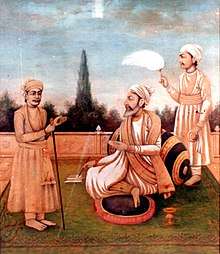Hakim Muhammad Sharif Khan
| Hakim Muhammad Sharif Khan | |
|---|---|
 Hakim Sharif, probably during his days as Royal Hakim to the Mughal emperor. | |
| Born |
1722 Delhi, Mughal India |
| Died | 1805 or 1807[1] or 1816 |
| Known for |
Prominent member of the Delhi School of Unani medicine Royal physician to Mughal emperor Shah Alam II |
| Title | Ashraf-ul-Hukma |
| Children | Hakim Sadiq Ali Khan |
| Relatives | Hakim Ajmal Khan (great-grandson) |
Hakim Muhammad Sharif Khan was a Sunni Muslim Hakim (physician in Unani / Greek medicine) of some importance in Mughal India at end of 18th century. He was born in 1722 in Delh.
His ancestors arrived in India from modern day Uzbekistan during the time of Emperor Babur. He was the royal Hakim at the court of Mughal emperor Shah Alam II (ruled 1759-1806) who gave him the title Ashraf-al-Hukma (The Best of Physicians), and possibly to his son Akbar II (ruled 1806-1837).
Achievements
Since Hakim Sharif was based in Delhi, his family of hakims, the "Sharifi" family, came to be recognised as the Delhi school of Hakims.[2]
Muhammad Sharif Khan came from a "a family of theologians and physicians", and ultimately descended from Ubayd-Allah Mahmud Ahrar (died 1490), "an influential Sufi Shaikh of the Naqshbandi order in Transoxiana".[1]
He was a prolific writer, and wrote some seventeen books on medicine, of which the most famous was "Elaaj al-Amraaz", (The Cures for Diseases) which is still considered a great authority in the field. He is also famous for compiling the most complete and authoritative collection of Unani medicinal formulas into one master work.
He also translated the Quran into Urdu, which is widely regarded as the first translation of the Qur'an into that language.
He was responsible for introducing aspects of European science in Unani medicine his day, and he also composed works in Persian, as well as in Arabic, including a dictionary of Indian drugs.
He is the great-grandfather of Hakim Ajmal Khan, a renowned hakim, scholar, and politician of his time in pre-partition India.
Death
Sources differ as to when he died, some recording that he died in 1805 or 1807[1], and others that he died a decade later in 1816.
For his life and writings, see:
- C.A. Storey, Persian Literature: A Bio-Bibliographical Survey. Volume II, Part 2: E.Medicine (London: Royal Asiatic Society, 1971), pp. 283–5 no. 494.
- Carl Brockelmann, Geschichte der arabischen Litteratur, Supplement, 3 vols. (Leiden: Brill, 1937-1942), vol. 2, p. 864 no. 56a
References
- 1 2 3 Speziale 2009.
- ↑ cristi.albu@gmail.com. "Greek Medicine: THE SHARIFI FAMILY TRADITION". www.greekmedicine.net. Retrieved 2017-10-19.
Sources
- Speziale, Fabrizio (2009). "ŠARIF KHAN, Moḥammad". Encyclopaedia Iranica.